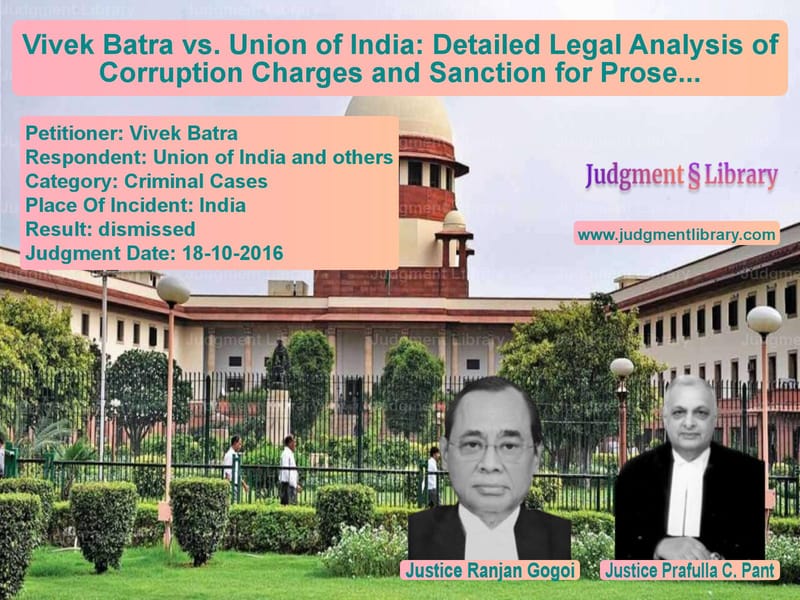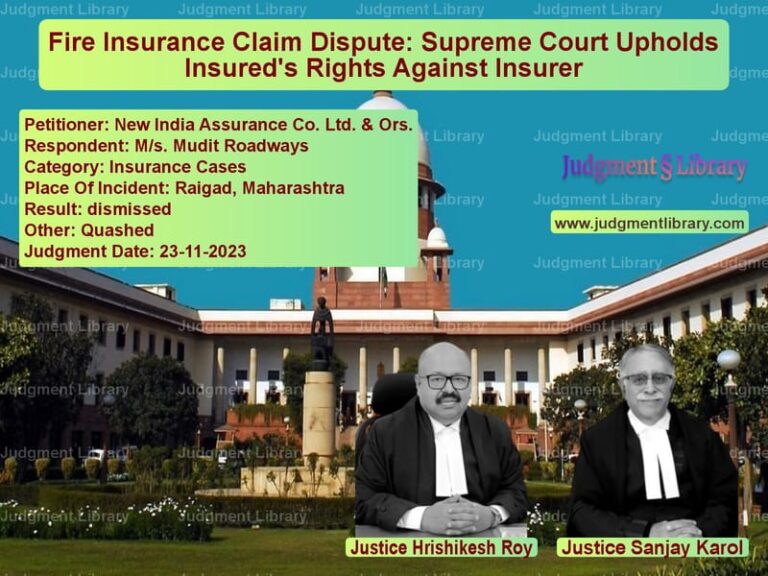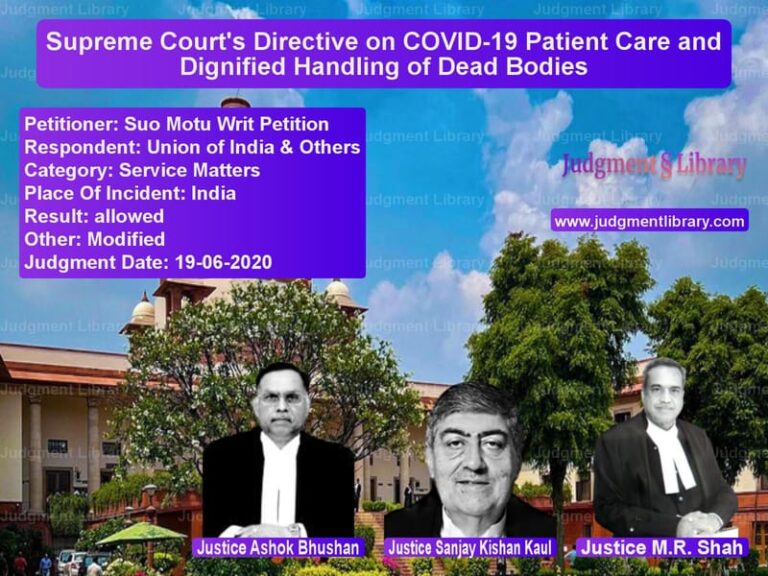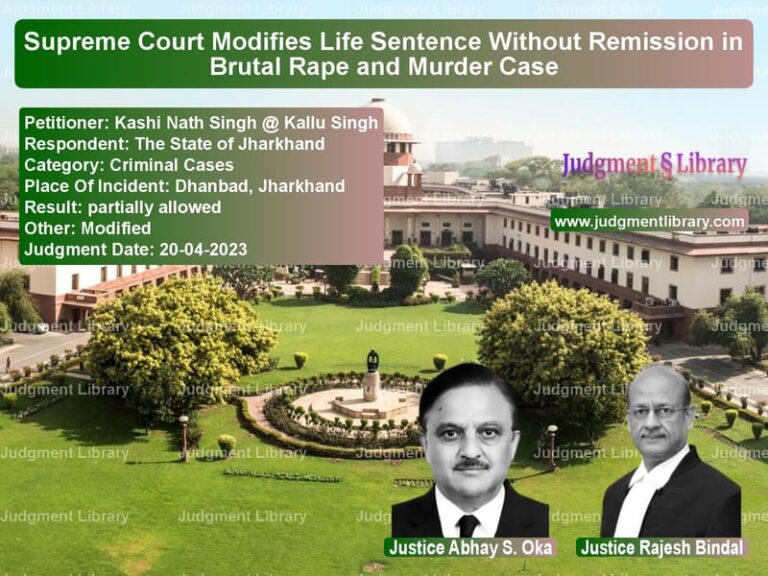Vivek Batra vs. Union of India: Detailed Legal Analysis of Corruption Charges and Sanction for Prosecution
The case of Vivek Batra vs. Union of India is a landmark judgment concerning corruption allegations against a high-ranking Indian Revenue Service (IRS) officer. The legal battle revolved around whether the sanction granted for prosecution under the Prevention of Corruption Act, 1988 was valid and whether due process was followed in granting this sanction. The case brings forth crucial questions regarding procedural fairness, the role of the Central Vigilance Commission (CVC), and the discretionary power of government authorities in sanctioning prosecution.
Background of the Case
Vivek Batra, an IRS officer of the 1992 batch, was accused of possessing assets disproportionate to his known sources of income. On April 4, 2005, the Central Bureau of Investigation (CBI) registered an FIR under RC No. BA1/2005/A0017, alleging that he had amassed assets worth Rs.1,27,38,353 in his name and in the names of his wife and minor son during the period between January 4, 1993, and March 31, 2004.
The prosecution further alleged that Batra had engaged in benami transactions, investing Rs.56,30,296 through two companies:
- M/s. ARJ Impex Pvt. Ltd. – A company incorporated by Priyanka Batra (wife of the appellant), which later transferred its shares to two of her uncles.
- M/s. Malik Hospitality Services Pvt. Ltd. – A company that acquired assets worth Rs.20,52,013, largely through unsecured loans from individuals and firms.
Legal Issues and Charges
The core legal issues raised in the case included:
- Whether the sanction granted by the competent authority was valid.
- Whether the initial reluctance of the Finance Ministry to grant sanction could invalidate the final approval.
- The role of CVC and Department of Personnel and Training (DOPT) in the sanctioning process.
- Whether procedural irregularities affected the validity of the sanction.
Arguments by the Appellant
The appellant’s legal team, led by senior advocate K.K. Venugopal, raised several arguments:
1. Lack of Sufficient Evidence
The appellant argued that the Finance Ministry initially opined that the available evidence was insufficient to justify prosecution. This viewpoint was later overridden by the CVC, which recommended sanction.
2. Conflicting Administrative Opinions
The defense highlighted that:
- The Finance Ministry’s initial stance opposed prosecution.
- The CVC recommended sanction, which the Finance Ministry reconsidered before forwarding the case to DOPT.
- The DOPT did not fully support prosecution, instead recommending an administrative warning.
- Despite this, the final sanction was granted by a successor Finance Minister.
3. Procedural Violations
The appellant contended that the procedural rules under the Government of India (Allocation of Business) Rules, 1961 were not strictly followed. The argument was based on the principle laid down in Nazir Ahmad v. King-Emperor, which stated:
“Where a power is given to do a certain thing in a certain way, the thing must be done in that way or not at all.”
4. Precedent from Bachhittar Singh Case
The appellant cited Bachhittar Singh v. State of Punjab, arguing that administrative notings expressing different opinions could not be overruled arbitrarily.
Arguments by the Respondents
The Union of India and CBI presented a counterargument, defending the legitimacy of the sanction:
1. Judicial Review of Sanction Orders
The prosecution argued that judicial review of sanction orders is limited, and courts should not interfere unless there is a clear case of mala fide action.
2. Role of the Central Vigilance Commission
The CVC, a statutory body under the Central Vigilance Commission Act, 2003, had twice recommended prosecution. The court cited:
“Clause (g) of Section 8 of the CVC Act empowers it to advise the Government on such matters as may be referred to it.”
3. Finance Minister’s Authority
The CBI argued that the Finance Minister had the ultimate authority to approve prosecution, and conflicting opinions within administrative departments did not invalidate the final decision.
Supreme Court’s Judgment
The Supreme Court ruled against the appellant, holding that the sanction was legally valid. The court’s reasoning included:
- Sanction Authority: The Finance Minister, as the Cadre Controlling Authority, was competent to approve the sanction.
- No Violation of Rules: The procedural steps undertaken in the sanctioning process adhered to legal requirements.
- Judicial Review Limitations: The court reiterated that courts should not interfere with sanctioning decisions unless there is clear evidence of procedural mala fides.
Key Legal Precedents Considered
The court cited several past judgments:
- Jasbir Singh Chhabra v. State of Punjab – Emphasized that administrative decisions should be final.
- Sethi Auto Service Station v. Delhi Development Authority – Clarified that internal notings do not constitute final decisions.
- Nazir Ahmad v. King-Emperor – Reaffirmed that actions must strictly adhere to procedural requirements.
Conclusion
The Supreme Court dismissed the appeal, allowing the prosecution to proceed. The court further directed:
- The trial court must conclude the case expeditiously.
- The interim stay granted on prosecution was vacated.
- The ruling did not pre-judge the outcome of the trial.
This judgment reinforces that procedural disagreements among government bodies do not automatically render sanction orders invalid. The case serves as a benchmark for corruption trials, emphasizing the importance of evidence-based decision-making and the limited scope of judicial intervention in administrative decisions.
Don’t miss out on the full details! Download the complete judgment in PDF format below and gain valuable insights instantly!
Download Judgment: Vivek Batra vs Union of India and o Supreme Court of India Judgment Dated 18-10-2016.pdf
Direct Downlaod Judgment: Direct downlaod this Judgment
See all petitions in Fraud and Forgery
See all petitions in Money Laundering Cases
See all petitions in Bail and Anticipatory Bail
See all petitions in Extortion and Blackmail
See all petitions in Juvenile Justice
See all petitions in Judgment by Ranjan Gogoi
See all petitions in Judgment by Prafulla C. Pant
See all petitions in dismissed
See all petitions in supreme court of India judgments October 2016
See all petitions in 2016 judgments
See all posts in Criminal Cases Category
See all allowed petitions in Criminal Cases Category
See all Dismissed petitions in Criminal Cases Category
See all partially allowed petitions in Criminal Cases Category







